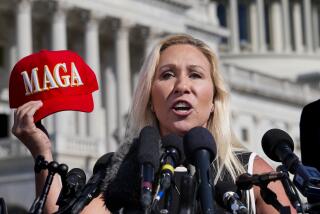Q&A: How does the House elect a new speaker?
WASHINGTON — At noon on Thursday, Republicans will gather behind closed doors and vote by secret ballot for their candidate for the most powerful job in the House, a post that’s second in line to the presidency — Speaker of the House.
The Republican caucus — at 247, the largest majority in more than 80 years — will select its nominee to replace Speaker John Boehner, R-Ohio, who has announced he is stepping down at the end of October after nearly five years in the post.
But that’s not the final word. The full House — 435 Republicans and Democrats — will vote for speaker on Oct. 29.
Some questions and answers about the selection process:
___
WHAT DOES THE SPEAKER DO?
The speaker of the House is the leader and presiding officer of the chamber. The speaker directs policy and procedure decisions, gives the oath of office to members and generally acts as spokesman for the House in negotiations with the Senate and the president. The speaker is also second in line to succeed the president. The speaker has traditionally been a House member from the majority party, but House rules say the chamber can select anyone as speaker, even non-members. That has never happened.
___
WHY IS JOHN BOEHNER RESIGNING?
Boehner announced Sept. 25 that he planned to resign amid growing discontent among some of the most conservative members of the House Republican conference. Some tea partyers were pushing for a vote to oust Boehner as speaker, a formal challenge that hasn’t happened in more than 100 years. They complained that Boehner wasn’t fighting hard enough to strip Planned Parenthood of government funds, even though doing so risked a government shutdown.
___
WHO IS RUNNING TO REPLACE HIM?
The leading candidate is California Rep. Kevin McCarthy, the current House majority leader. Rep. Jason Chaffetz of Utah, the brash 48-year-old chairman of the high-profile House oversight committee, is challenging McCarthy, saying he can bring the caucus together. Rep. Daniel Webster, a former speaker of the House in Florida, is also running.
___
IS MCCARTHY EXPECTED TO WIN?
He’s the favorite, but some Republicans worry that his speakership would be too similar to Boehner’s. And some have questioned his leadership and communication skills after he suggested last week that the purpose of a special House committee investigating the deadly attacks in 2012 of the U.S. mission in Benghazi, Libya, was to drive down Hillary Rodham Clinton’s poll numbers. Clinton, secretary of state at that time, is now the front-runner for the Democratic nomination for president.
___
HOW IS THE SPEAKER SELECTED?
First, the House Republican caucus elects a speaker candidate through one or more rounds of votes by secret ballot. At the meeting scheduled for Thursday, the candidates themselves won’t make speeches but will be nominated by other members of the caucus. Republicans will write their picks on paper ballots that are numbered so no extra ballots can be thrown in.
Once the conference has made its pick for speaker, the full House must vote as well. Boehner announced on Monday that the full House vote will occur Oct. 29.
___
HOW DOES THE HOUSE VOTE WORK?
Generally, Republicans vote for their nominee and Democrats vote for theirs, in this case minority leader Nancy Pelosi of California. Republicans are not bound to vote for the caucus nominee, though, so there is potential for the party to be split during the floor vote. The winner must have a majority — or 50 percent plus one — of the chamber, so if no candidate wins immediately then another round of votes will be held. The new speaker is sworn in immediately after winning the vote.
There hasn’t been a second round of votes since 1923, when a group of progressive Republicans challenged the incumbent Speaker Frederick Gillett of Massachusetts. Gillett was elected after nine ballots.
In 1856, amid disagreements over slavery and immigration before the Civil War, House Speaker Nathaniel Banks was elected after 133 rounds. That election took two months.
___
IF MCCARTHY WINS, WHO BECOMES MAJORITY LEADER?
Boehner announced Monday that caucus elections for majority leader and majority whip, the party’s No. 2 and No. 3 House leadership posts, will be held after the Oct. 29 floor vote for speaker.
Louisiana Rep. Steve Scalise, the current majority whip, and Georgia Rep. Tom Price, the chairman of the House Budget Committee, have announced that they are running for House majority leader. If Scalise wins majority leader, the caucus will then pick a new whip. Several lawmakers have said they are running for that post, including Reps. Patrick McHenry of North Carolina, Pete Sessions of Texas, Dennis Ross of Florida and Markwayne Mullin of Oklahoma.
Those posts are elected by the GOP caucus and do not have to be voted on by the full House.
___
Find Mary Clare Jalonick on Twitter at https://twitter.com/MCJalonick
Copyright 2015 The Associated Press. All rights reserved. This material may not be published, broadcast, rewritten or redistributed.
More to Read
Sign up for Essential California
The most important California stories and recommendations in your inbox every morning.
You may occasionally receive promotional content from the Los Angeles Times.









